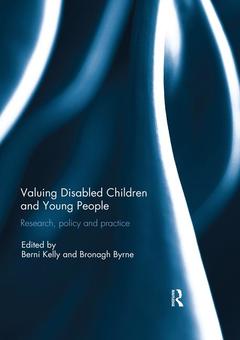Description
Valuing Disabled Children and Young People
Research, policy, and practice
Coordinators: Kelly Berni, Byrne Bronagh
Language: English
Subjects for Valuing Disabled Children and Young People:
Keywords
Young Men; Barnardos; Disabled Children; Child Care in Practice; Young People; disability studies; UN; disabled youth; ECEC Context; early childhood education; Social Care Trust; education; Disabled Children’s Rights; inclusion; ECEC Programme; participation; Ai Ns Tr Ea; social justice; Significant Intellectual Disabilities; social work funding; Status Subordination; transition; Education System; CRPD; Tightened Eligibility Criteria; Hart’s Ladder; Literature Review; UK Law; Disabled Young People; Sp Ec Ia; European Disability Forum; Voluntary Sector Providers; Learning Disabilities; DVD Project; Social Science Research; DMD
Publication date: 01-2019
· 17.4x24.6 cm · Paperback
Publication date: 08-2016
· 17.4x24.6 cm · Hardback
Description
/li>Contents
/li>Readership
/li>Biography
/li>
Focusing on contemporary childhood disability issues, and relevant to the lived experiences of disabled children and young people and their families, this book addresses themes such as transition, identity, education, inclusion, and service provision. It also includes insightful contributions on participatory research and practice with disabled children and young people, including an emphasis on capability, voice, and communicative spaces for those with life limiting and more severe levels of impairment.
The contributions to this book are grounded in a commitment to the rights of disabled children and young people, as explicitly recognised under the United Nations Conventions on the Rights of the Child (1989) and Rights of Persons with Disabilities (2006). However, the authors also draw our attention to the detrimental impact of economic austerity and conflict on the extent to which these rights are being realised, encouraging further consideration of issues relating to social justice, inter-dependence, and participation. Addressing the diversity of disabled children?s lives across service domains and international contexts, this book provides an evidence base to support the realisation of the rights of disabled children and young people. This book was originally published as a special issue of Child Care in Practice.
Introduction: Valuing Disabled Children1. "We Could Kid On that This is Going to Benefit the Kids but No, This is about Funding": Cutbacks in Services to Disabled Children and Young People in Scotland2. Prioritising the Inclusion of Children and Young People with Disabilities in Post-conflict Education Reform3. "The Things that are Inside of You are Horrible": Children and Young Men with Duchenne Muscular Dystrophy Talk about the Impact of Living with a Long-term Condition4. To be Cared For and to Care: Understanding Theoretical Conceptions of Care as a Framework for Effective Inclusion in Early Childhood Education and Care5. Valuing the Place of Young People with Learning Disabilities in the Arts6. The Participation of Disabled Children and Young People: A Social Justice Perspective7. Understanding Young Children’s Capabilities: Approaches to Interviews with Young Children Experiencing Disability8. From Individualism to Co-construction and Back Again: Rethinking Research Methodology for Children with Profound and Multiple Learning Disabilities9. Narrativising Envisioned Futures by Adolescents with Significant Intellectual Disabilities10. Transition, Inclusion and Partnership: Child-, Parent- and Professional-led Approaches in a European Research Project11. Exploring Transitions with Disabled Young People: Our experiences, Our Rights and Our Views12. "Yes They are Listening but Do They Hear Us?" Reflections on the Journey of the Barnardo’s Participation Project
Berni Kelly is a Senior Lecturer in Social Work at Queen’s University Belfast, UK. Her main research interests are child and youth disability studies, participatory disability research, and transitions to adult life. She is currently working on studies of disabled children and young people living in, and leaving, public care. She is co-chair of the Disability Research Network at Queen’s University Belfast.
Bronagh Byrne is Lecturer in Social Policy at Queen’s University Belfast. Her key research interests are in disability and children’s rights, education, and transitions. She has worked on a number of studies examining the application of international human rights law to policy and practice. She is co-chair of the Disability Research Network at Queen’s University Belfast.




